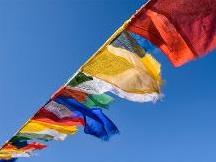by Dr. Thor Gonen, The Buddhist Channel, Jan 20, 2016
The founder of Bhavana House based in Tel Aviv argues for Buddhism and how it can help to regain a more compassionate, kinder Israel. Speech originally delivered at the United Nations Day of Vesak, Bangkok on April 30, 2015.
Tel Aviv, Israel - Israel is a very young country, a 67 years old baby, but its innocence and sweetness had vanished very quickly, almost 50 years ago, with the occupation of Palestinian lands and the systematic discrimination and oppression of the Palestinian population.
 This is not politics I am talking about but a deep concern about the illness of the Israeli society and it is time to speak up. As Dante Alighieri said, "The darkest places in Hell are reserved for those who maintain their neutrality in times of moral crisis".
This is not politics I am talking about but a deep concern about the illness of the Israeli society and it is time to speak up. As Dante Alighieri said, "The darkest places in Hell are reserved for those who maintain their neutrality in times of moral crisis".Through claiming absolute rights on the Holy Land, based on Biblical Myths and the notion that God chose the Jews above other nations, Israeli society gradually transformed to be an arrogant, depriving, greedy, aggressive, ignorant, aloof and racist with very little compassion or shame towards the Arab minority and the Palestinians.



 Tibetan Buddhist prayer flags
Tibetan Buddhist prayer flags

